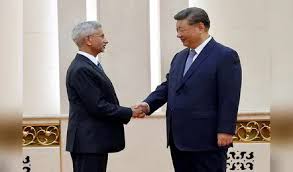EAM Jaishankar meets Chinese President Xi Jinping with other SCO foreign ministers

In a major diplomatic development, External Affairs Minister (EAM) S. Jaishankar met Chinese President Xi Jinping during the Shanghai Cooperation Organisation (SCO) foreign ministers’ meet in Beijing. The gathering, held on July 15, 2025, may signal a shift in the strained relationship between India and China.
This meeting wasn’t just another multilateral formality. It marked a significant re-engagement between two of Asia’s biggest powers, especially after years of tensions following the Galwan clash in 2020.
Why the Meeting Matters
Jaishankar, along with other SCO foreign ministers, met President Xi Jinping as part of the summit schedule. The SCO includes India, China, Russia, and several Central Asian countries, making it a key regional platform.
During the meeting, Jaishankar conveyed greetings from President Droupadi Murmu and Prime Minister Narendra Modi. He also updated President Xi on India-China relations and underlined the need for a long-term strategic outlook.
He stressed the importance of managing differences through dialogue and said India remained committed to peaceful cooperation.
First Visit in Years
This was Jaishankar’s first trip to mainland China in almost five years. It was also the highest-level diplomatic contact between the two countries since the Galwan Valley conflict in 2020, which led to the deaths of soldiers on both sides.
That event froze bilateral ties and escalated military tensions at the Line of Actual Control (LAC). While some progress has been made through talks, both countries still have unresolved border issues.
What China Said
Chinese state media viewed the meeting positively. Editorials in outlets like Global Times called it a sign of India’s pragmatic diplomacy and willingness to re-engage.
President Xi encouraged cooperation among SCO nations and urged joint efforts in areas such as regional security, digital governance, and trade.
Chinese Vice President Han Zheng also met Jaishankar separately. He highlighted the need for practical cooperation and peaceful coexistence. He added that stable border management would help improve trust.
Core Issues: Border, Trade, and Trust
While the meeting was brief, it touched on several long-standing issues:
- Border Tensions: Jaishankar called for full disengagement from all friction points in Eastern Ladakh. He reiterated that peace at the border is essential for any meaningful improvement in ties.
- Trade Access: India raised concerns over restrictions on key exports and the growing trade imbalance. It also highlighted the need for fairer access to sectors like rare earths and pharmaceuticals.
- Strategic Balance: Both nations discussed the changing global order. India emphasized the need for multipolar cooperation and avoiding zero-sum rivalries.
Political Response at Home
Back in India, the meeting drew sharp reactions. Congress leader Rahul Gandhi criticized the Modi government for engaging with China without resolving the border crisis.
He called the visit “a full-blown circus” and accused the government of downplaying national security concerns. His comments stirred debate across political and media circles.
A Symbol or a Turning Point?
Experts remain divided. Some see the meeting as a symbolic gesture, while others believe it could lead to gradual normalization.
Strategic analyst Dr. Rakesh Sharma said, “When Jaishankar meets Xi Jinping face to face after so long, it signals serious intent from both sides. Even if progress is slow, dialogue is the only way forward.”
However, critics argue that without concrete steps, meetings like this may have little long-term impact.
Looking Ahead
India and China will continue interacting through forums like BRICS, G20, and SCO. Both countries are expected to resume military commander-level talks soon to address remaining border concerns.
Economic cooperation may also see renewed discussions, especially around trade barriers and supply chain diversification. However, deep-rooted distrust means any reset will take time and effort.
Final Thoughts
The Jaishankar–Xi Jinping meeting may not change everything overnight, but it matters. After years of silence and tension, both sides are talking again — and that’s a start.
India wants secure borders and fair trade. China seeks regional influence and stability. For both nations, managing their complex relationship is vital — not just for themselves but for the entire Indo-Pacific region.






